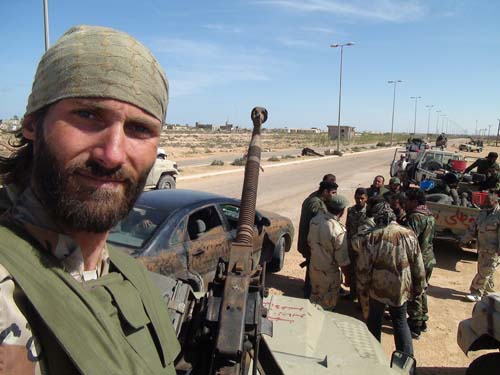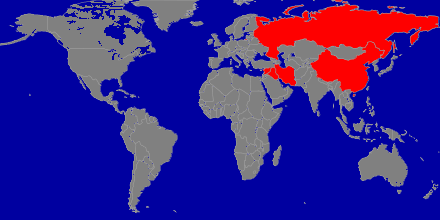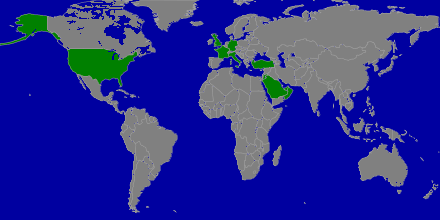The Arab Spring and the Democratic Domino Theory
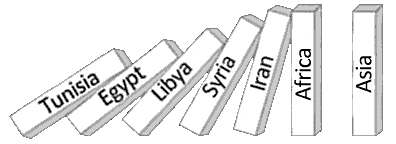
The Democratic Domino Theory
You have a row of dominoes set up, you knock over the first one, and what will happen to the last one is the certainty that it will go over very quickly. So you could have a beginning of a disintegration that would have the most profound influences. – President Dwight D. Eisenhower
Eisenhower’s answer to a question about the spread of communism in 1954 would later be developed by others into the domino theory. The theory was simple: if a country fell under the influence of communism, then neighboring countries would also, and communism would spread throughout a region. The domino theory became a major influence on American foreign policy throughout the Cold War.
The concept of a domino theory was given new life in 2003. Termed the “Democratic Domino Theory” (or “reverse-domino theory”), it became one of many rationales for the war in Iraq. Some in the Bush administration believed that establishing a democracy in Iraq would lead to the spread of democracy in the Middle East, and lead to the overthrow of authoritarian regimes hostile to US interests. This was a short-lived iteration of the domino theory (and one that few have even heard of), and was discredited as years passed when the Iraqi model failed to inspire change in the region.
Although Iraq was clearly not the domino that set off the chain reaction that many had hoped for, the Arab Spring has shown that the Democratic Domino Theory is alive and well. The dominoes are authoritarian regimes, and they are falling.
What happened?
Just a few years ago the dominoes appeared to be glued to the table, unmovable and permanent. Authoritarian rulers were grooming their children to take office when they died, and talk in the media and policy circles focused on hopes that the son wouldn’t be as bad as the father.
On December 18, 2010 the world changed. Unrest erupted in Tunisia in response to a young man setting himself on fire in protest the day before. Tunisians took to the streets and within a month the regime of Ben Ali collapsed.
The first domino had fallen. Inspired by the protests in Tunisia, Egyptians overthrew President Hosni Mubarak after two weeks of an intense standoff between the people and the regime.
The Arab Spring was underway. Protests erupted across the Arab world, and in many cases the authoritarian regimes responded with bloodshed. Libya and Syria were the worst examples of how far the despots would go to cling to power, as they plunged their countries into civil war. The Libyan civil war, which I fought in, was successful and we overthrew the regime of Muammar Gaddafi. As of this writing, however, Bashar Assad of Syria remains in power.
How did all of this happen? The catalyst for the Arab Spring was social media. Expanded internet service gave Arabs access to social media like Facebook and Twitter, which allowed them to communicate and coordinate on a mass scale. Suddenly, it became possible to quickly call thousands of people to protest. Revolutions could be engineered with a few clicks of a keyboard. Social media became the turpentine that once poured on the table dissolved the glue that kept the dominoes standing.
Ironically, it was the authoritarian regimes that paved the way for their own demise through internet access. Gaddafi’s son ran the largest internet service provider in Libya, Assad was head of the organization that introduced the internet to Syria, and internet service in Tunisia was mostly provided by Ben Ali’s government.
After Ben Ali was overthrown the regimes learned quickly: a principal strategy of quelling Arab Spring unrest in their countries was to limit internet access.
Why the Arab Spring?
It is a significant intelligence and analytical failure that the Arab Spring took the West by surprise. The phenomenon was entirely predictable to anyone who had spent enough time in the region. The unrest was there, a seething anger waiting for the spark to ignite it. During my years traveling the region by motorcycle, living among the local population and making friends throughout the Arab World, I would hear the murmurs of discontent. Sometimes more than just murmurs. Arabs were usually cautious and reserved in their criticisms, worried about who was listening, but every now and then someone would reveal the truth about what people thought of their government. The discontent was boiling just beneath the surface.
The late Christopher Hitchens wrote of similar experiences during his travels in authoritarian states:
Someone in a café makes an offhand remark. A piece of ironic graffiti is scrawled in the men’s room. Some group at the university issues some improvised leaflet. The glacier begins to melt; a joke makes the rounds and the apparently immovable regime suddenly looks vulnerable and absurd. – Christopher Hitchens
Add to this the ability to organize via social media and the formula for mass uprising was complete.
But why did it spread so quickly from country to country, toppling authoritarian regimes like dominos? This too was predictable. A pan-Arab opposition to the governments of North Africa and the Middle East has existed for years, and has been stoked by Al Jazeera, the universally popular news network in the Arab World. Virtually every television in the Arab World uses a satellite dish, and with the unifying language of Arabic most get their news from arabic Al Jazeera. What a commentator says on Al Jazeera reaches the ears of millions, and the images shown can inspire the rage of even more.
Additionally, pan-Arabism and a culture of protest already existed because of opposition to the policies of Israel and the West, particularly with regards to the Israeli-Palestinian conflict and the Iraq war. The authoritarian rulers applauded and helped incite these protests, unaware of the seeds they were sowing.
There is also a history of political movements sweeping through the region. First was the spread of Islam. In the 20th century there was Arab Nationalism and Arab Socialism. Now is the time of the Arab Spring.
Furthermore, Arab culture tends to emulate success. Many Arabs talk of wanting to develop their countries and introduce economic models to be like Dubai. They want a democratic form of government because they see the freedom, liberty, and successes of the Western world. Even on a micro-level following in the footsteps of success is a tradition. When a friend or relative immigrates to another country and is successful, many more want to do the same. Imitation is inherent in culture, but from my experiences in the Arab World I have found it to be an especially strong force in North Africa and the Middle East.
It was intuitive and predictable that once a regime fell, the Arab Spring would spread rapidly to other countries. The dominos had been arranged long ago, and that the regimes would fall in succession was just as predictable as dominos falling once the first is pushed over.
The Iranian Spring
Once Syria falls, Iran is the next major domino down the line. The loss of Iran’s main Arab ally in the Middle East will be devastating to the regime’s influence in the region. Iraq is slowly taking Syria’s place, but with extensive problems of its own, Iraq is a poor substitute.
Sanctions have devastated Iran’s economy. Their currency has lost half its value, inflation is rising, and assets have been frozen. Iran will likely have to sell oil to Asia at discounts, in barter agreements, or on other unfavorable terms to stay afloat.
The Iranian people are suffering the effects of their government’s policies towards the West and their pursuit of a nuclear program. A recent Gallup poll found that nearly half of Iranians claim there were times in the past year when they couldn’t afford to buy food for their families.
Iranians already rose up against the current regime during the Green Revolution of 2009. The government crushed it with an iron fist, and the world stood by and did nothing. Some Iranians have clearly demonstrated a desire for regime change, and now that those on the sidelines find themselves suffering under sanctions because of their government’s wreckless international policies, the conditions are being set for a larger uprising the next time.
When Assad is removed from power in Syria it will be taken as a sign of Iranian weakness. Iran’s nuclear facilities will likely be destroyed by an Israeli or American air strike at some point as well. This will also be viewed as regime weakness, and possibly anger some Iranians that they have suffered under sanctions for a program that their government couldn’t even defend.
Finally, the Sunni Gulf Cooperation Council (GCC) countries, with Saudi Arabia at the helm, are engaged in a sectarian rivalry with Shia Iran that is rapidly coming to a head. They are energized and mobilized by the uprising in Syria, and have their sights set on further weakening Iran. Once they get rolling on Syria they won’t want to stop until their conflict with Iran is resolved as well.
What Comes Next?
“It was curious to think that the sky was the same for everybody, in Eurasia or Eastasia as well as here. And the people under the sky were also very much the same–everywhere, all over the world, hundreds or thousands of millions of people just like this, people ignorant of one another’s existence, held apart by walls of hatred and lies, and yet almost exactly the same–people who had never learned to think but were storing up in their hearts and bellies and muscles the power that would one day overturn the world.” – George Orwell
The Arab Spring has inspired protests around the world. Africa, Asia, Europe, the Americas, and even the island nation of Fiji have seen protests break out in response to the successes of the Arab Spring.
Most of these protests did not amount to much – they were snuffed out by the regime or died off on their own, or had modest goals that were achieved. Africa and Asia, however, are two regions where change is long overdue. The dominos are almost ready to fall, and few of them will fall peacefully.
As long as the momentum of the Arab Spring continues there is little that can stop a wave of democratization from leaping country to country, and region to region. Once one domino in these regions falls, it should accelerate the collapse of neighboring regimes.
Picking Sides
The battle lines have been drawn. On one side are the democratic countries, assisted by a small group of non-democratic ones (like those of the GCC) that have joined them in order to take advantage of revolutions for their own strategic interests. On the other side are the authoritarian and non-democratic (and deeply-flawed democratic) countries, consisting of both vulnerable regimes and their allies who support them for political, economic, and strategic interests, as well as a desire to prevent the Springs from spreading to them. The Economist Intelligence Unit Democracy Index provides a good visual illustration of where countries stand in this fight:
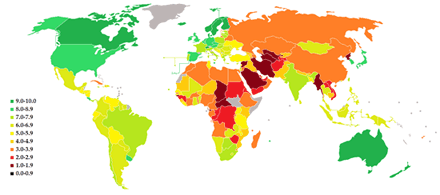
2011 Democracy Index (Dark green countries are the most democratic, dark red countries are the most authoritarian)
A Responsibility to Act
The countries of the free world have a responsibility to encourage and assist in the overthrow of authoritarian regimes. In the 21st century no man should have to live his life under an oppressive government.
In 2010 only 11.3% of the world’s population lived in democratic countries. Of the 88.7% who didn’t, 37.6% lived under authoritarian regimes. This means that 6.12 billion people don’t live under fully democratic systems of government, and nearly 2.6 billion of them are ruled by authoritarian regimes.
2.6 billion. In the 21st century.
There is no excuse for allowing this to continue. We have planted the flag of a democratic country on the moon, yet allow a third of the population on Earth to live under authoritarianism.
The authoritarian regimes of the world have been weakened. The despots are scared, and they should be. They know what is coming. We can eliminate this scourge with an aggressive, unwavering strategy of isolating and destabilizing their governments, and supporting revolutions against authoritarian rule.
The Democratic Domino Theory should be a major influence on US and EU foreign policy. The regimes are desperately trying to glue their dominos to the table (and the glue is often made in Russia and China) by better arming themselves, engaging in increased surveillance of their populations, and restricting internet access. There is a window of opportunity to liberate many more countries from authoritarianism while the momentum is still on the side of freedom. Allowing authoritarian regimes to learn from the mistakes of those that have fallen and further entrench themselves in power is a mistake that will have profound moral, strategic, and historical consequences for the 21st century.

